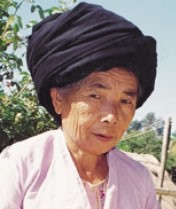Sanda in China

Photo Source:
Copyrighted © 2026
Operation China, Asia Harvest All rights reserved. Used with permission |
Send Joshua Project a map of this people group.
|
| People Name: | Sanda |
| Country: | China |
| 10/40 Window: | Yes |
| Population: | 1,500 |
| World Population: | 1,500 |
| Primary Language: | Language unknown |
| Primary Religion: | Ethnic Religions |
| Christian Adherents: | 2.10 % |
| Evangelicals: | 2.01 % |
| Scripture: | Unspecified |
| Ministry Resources: | No |
| Jesus Film: | No |
| Audio Recordings: | No |
| People Cluster: | Tibeto-Burman, other |
| Affinity Bloc: | Tibetan-Himalayan Peoples |
| Progress Level: |
|
Introduction / History
The Sanda believe that they have been living in the Sanda Mountains of southern Yunnan "since the beginning of the earth." They claim to have been in Xishuangbanna long before their relatives - the Jino and Ake - migrated there. In the past, Sanda men and women were renowned for their excessively long hair, but this practice is no longer observed. Today the Sanda are widely known as expert hunters and gatherers who take much pride in their weapon handling skills.
The Chinese authorities surprisingly acknowledge the Sanda as a separate people, giving them the suffix zu (nationality), but consider them too small to be afforded status as one of China's official minorities. The Sanda people were not counted under any nationality in the 1990 census but were combined into a list of Undetermined Minorities.
What Are Their Lives Like?
Rubber, bananas and soybean are the main crops harvested by the Sanda. In addition to the government quota, they are allowed to sell their excess produce in the marketplaces of Jinghong and Menglian. In recent years many Sanda youth have moved to the towns to find work. Intermarriage with other tribes is common among the Sanda, especially with the Jino, Ake, and Tai Lu.
What Are Their Beliefs?
The inhabitants of the six Sanda villages are animists. All Sanda homes possess spirit altars, which they hang in a prominent position in the main room of their homes. The Sanda say that in the past they were a spiritual people, but during the Cultural Revolution they lost their soul. The Sanda place great importance in burial practices. The corpse is placed in the ground for burial if the person was more than 60 years old. If someone dies by accident or before the age of 60, the body is cremated.
What Are Their Needs?
The Sanda must put their hope in Christ to be given eternal salvation.
Prayer Points
Pray for the gospel to penetrate every Sanda family and community, creating a movement to Christ.
Pray for Sanda disciples who will make more disciples.
Pray for the Sanda people to understand the holiness, power and goodness of the King of kings.